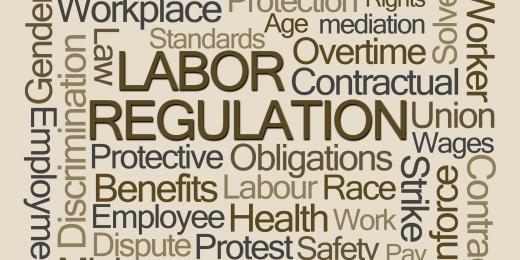A sad truth that many UK
employment lawyers will recognise is that in discrimination claims, the claimant employee may have experienced many, many acts of discrimination, harassment and victimisation before he or she finally brings an
Employment Tribunal claim. So, is it appropriate for an
Employment Tribunal to require a claimant to select the most serious allegations and only determine the case based on these examples? Although the best
employment lawyers in London will recall previous cases that have endorsed a ‘reasonable bounds’ test, in
Tam v Hughes & others, the
Employment Appeal Tribunal thought that this was perverse and could prevent the case being justly determined.
The reasonable bounds test in discrimination claims
Employment claim solicitors will be familiar with the reasonable bounds test approved in
Hendricks v Commissioner of Police for the Metropolis and endorsed in
HSBC Asia Holdings v Gillespie. As the
Employment Tribunal in the Tam case indicated in its case management decision (the decision which was the subject of the appeal),
“In HSBC Asia Holdings BV & another v Gillespie [2010] UKEAT 0417 Underhill J suggested the use of samples where a Claimant complains of a very large number of discrete incidents but the gist of the claim can for all practical purposes by fairly tried by reference to a sample only, with a consequent reduction of the burden on the resources both of the parties and the Tribunal.
This echoes the Court of Appeal in the Hendricks case, familiar to all the best employment lawyers, where Mummery LJ encouraged parties “to keep the discrimination proceedings within reasonable bounds by concentrating on the most serious and the more recent allegations”
The discrimination claims in Tam v Hughes & Others
The Claimant was a GP who suffered a series of discriminatory acts following her fellow GPs and management at the Milestone Surgery, where she was a partner, that she was pregnant. She eventually resigned from the partnership in July 2017. Her ET1 included 21 alleged acts of direct sex/pregnancy discrimination, 19 alleged acts of harassment (16 of which were also relied on as acts of direct discrimination), and 6 alleged acts of victimisation.
Following a telephone case management hearing, the Claimant was asked to select 10 of the most recent and most serious claims to be heard – a ‘discrimination top 10’. The Tribunal said that
“A Tribunal has no power to prevent a Claimant pursuing a properly arguable claim, but it does not necessarily follow that all the claims need to be heard at a single hearing. In this case the Claimant is not prevented from relying upon the other events as background or context to the 10 events, or they may be pursued at a separate hearing.”
Although she was asked to select 10 of the most recent and serious allegations for consideration, no parts of her claim were struck out and the tribunal allowed that she could rely on the other matters identified as background or context or pursue them as separate claims at a later hearing.
The
Employment Appeal Tribunal recognised the broad case management discretion afforded to the
Employment Tribunal in Rule 29 of Schedule 1 of the
Employment Tribunals (Constitution & Rules of Procedure) Regulations 2013. This discretion must be exercised with the overriding objective of dealing with discrimination claims fairly and justly in mind.
While recognising the case management challenges of discrimination claims in particular, the
Employment Appeal Tribunal thought that there were a number of points that should be kept in mind by the
Employment Tribunal when exercising that discretion. These are set out in full in the judgment at paragraph 28 of the EAT’s judgment.
Perhaps the key point for top
employment solicitors to take on board is that although there will be some cases where it is appropriate for the tribunal to strike out claims that have no reasonable prospect of success but this will rarely be the case in discrimination claims, and unless it is so appropriate, most claims will stand to be determined after a full merits hearing.
In clarifying, the EAT went on to say
“… it is not open to the ET to otherwise limit the claims a complainant can pursue - that would be to restrict her access to justice and to potentially deny an effective remedy in a case of unlawful discrimination.”
The EAT went on to say “…there may be cases where it will be possible to separate out a sample of complaints or issues, such that these might usefully be heard in advance of the remaining allegations. Where that would be an appropriate course, it would be hoped that the parties (consistent with their obligation under the overriding obligation) would assist the ET by identifying and agreeing the complaints to be taken forward but, even if there were no such agreement, the ET would not be prevented from so directing, if that could properly be said to provide for the just determination of the particular case.”
The
Employment Appeal Tribunal considered that in the case before it
- There was an agreed list of issues which was not ‘unwieldy or unmanageable’
- The Respondents did not argue that they could not understand or respond to the pleaded case
- Both sides appreciated which was to be determined as a cause of action and which was evidentiary/background material
- It was clear that evidence given on one issue would address other factual issues at the same time
The Tribunal had not taken any of this into account and did not consider the difficulties that the order it had made would cause the Claimant. The appeal was allowed.
OTS Solicitors are employment law specialists, able to advise and support in all aspects of discrimination claims, unfair dismissal claims, redundancy and in settlement agreement situations. We advise employers and employees, providing intelligent, practical advice to help our clients achieve the results they need. To book an appointment to discuss your employment law issue please call 0203 959 9123.

